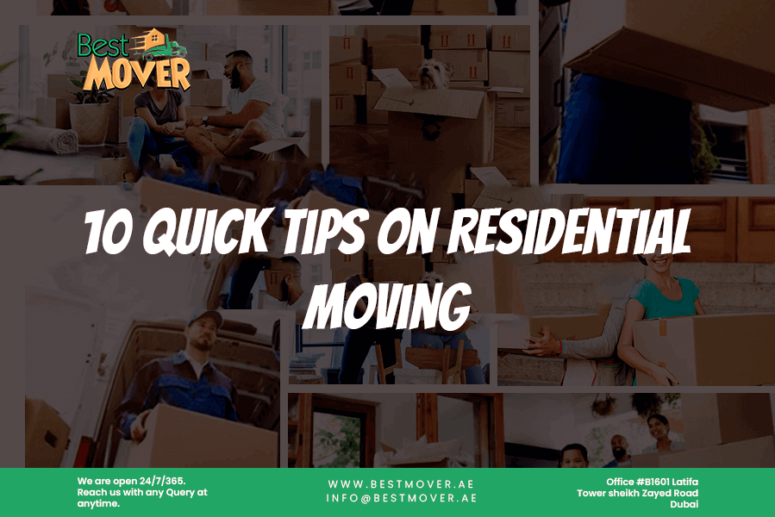
Moving to a new location is rarely as simple as it sounds. There is much to do both before and after the move. Residential relocation is a stressful, time-consuming, and tiring task. If you are migrating for the first time and do not plan ahead of time, you may encounter roadblocks and other issues. Whether you are moving across town or across the country, your transition may be disrupted rapidly. All of this is not to say that your house transfer will be a difficult experience; nevertheless, with a solid plan, you can avoid these disasters and ensure a smooth transition. Here are some suggestions to allow you to make the most of your relocation.
Here are quick tips for residential moving. Start planning early and create a checklist. Declutter and get rid of unnecessary items. Pack a “survival kit” with essential items. Label boxes for easy identification. Take inventory of your belongings. Hire professional movers for a smoother process. Notify relevant parties of your address change. Protect fragile items with proper packing materials. Take photos of electronic setups before dismantling. Finally, make sure to update your utilities and services with your new address.
-
Get Organized Early
Schedule ahead of time and get organized as soon as possible to reduce stress. Make your arrangements 30 to 60 days in advance to help you become organized and ensure a smooth house relocation. Buy some shifting magazines to understand how to plan your move.
-
Figure Out Your Move Strategy
Choose the most crucial items to relocate first. Plan your journey from point A to point B. You can develop your relocation strategy by asking your neighbors who have just relocated, your colleagues, or even experienced movers and packers. If you don’t want to deal with these details, you can engage a local transport company to create a strategy for you. Moving firms are the best people to talk to about your relocation plans.
-
Seize the Opportunity to Purge
Bringing unneeded items that you no longer use is not a good idea. Because this will not only necessitate a larger space but will also increase moving costs. Take advantage of the opportunities to get rid of any unnecessary items. You might auction them or give them to a charitable organization or starving individuals to achieve this goal. Larger things can be advertised on Craigslist, OLX, recycling, and other catalog websites. This strategy allows you to save space while also earning money.
-
Put Together a Packing Kit
Maintain a schedule if you have additional family or friends who can assist you with packing. Assign them chores like loading and labeling packing boxes. Allow them to work on only one room at a time if you have multiple rooms. They’ll bring black markers, a pencil, and other packing supplies. This is the most efficient approach for saving time and getting more done in less time. You can finish your packing ahead of time if you use this strategy.
-
Label Everything
Failure to label packages is among the most common mistakes people make when transferring. The issue is that when it comes time to unpack, they have no idea which product is in which box. Additionally, determining the answer takes too long, which is a pointless exercise. Label both sides of the box to ensure that you open the correct goods. The moving companies may be indifferent to confronting the designated size in front of them while unloading the moving boxes. Labeling each side of the stack will aid in your search for what you’re looking for. It makes no difference which side is on the ground.
-
Prepare a Moving Day Kit
It is critical to creating a relocation day kit with anything you will need on a moving day. Set aside a box and fill it with all of the essentials, such as light bulbs, cleaning materials, toilet paper, a set of clothes, garbage bags, and so on.
-
Be Ready for Your Movers
If you’ve booked a professional mover like Best Movers, make absolutely sure you’re prepared when they come. Just before moving staff arrives, make very sure you’ve collected everything. If you become confused while searching for your boxes, you will be belated and may incur additional costs.
-
Protect Your Valuables
If you don’t want to misplace your stuff, keep them in a secure place until relocation day. If you are using a moving company, be sure you have insurance on any precious or breakable items.
-
Hook Up Essential Services
Don’t ever forget to keep your postal location and utility bills up to date. It is critical that you understand how to update your mailing address and utility bills. You should have a phone connection, internet access, and broadband service as quickly as you move in.
-
Treat Your Movers
If you’ve asked family and friends to help you move and haven’t contacted moving companies, make sure to thank them with food and drinks at the end. A home transfer is not a simple undertaking, but you can greatly reduce anxiety by preparing ahead of time.
